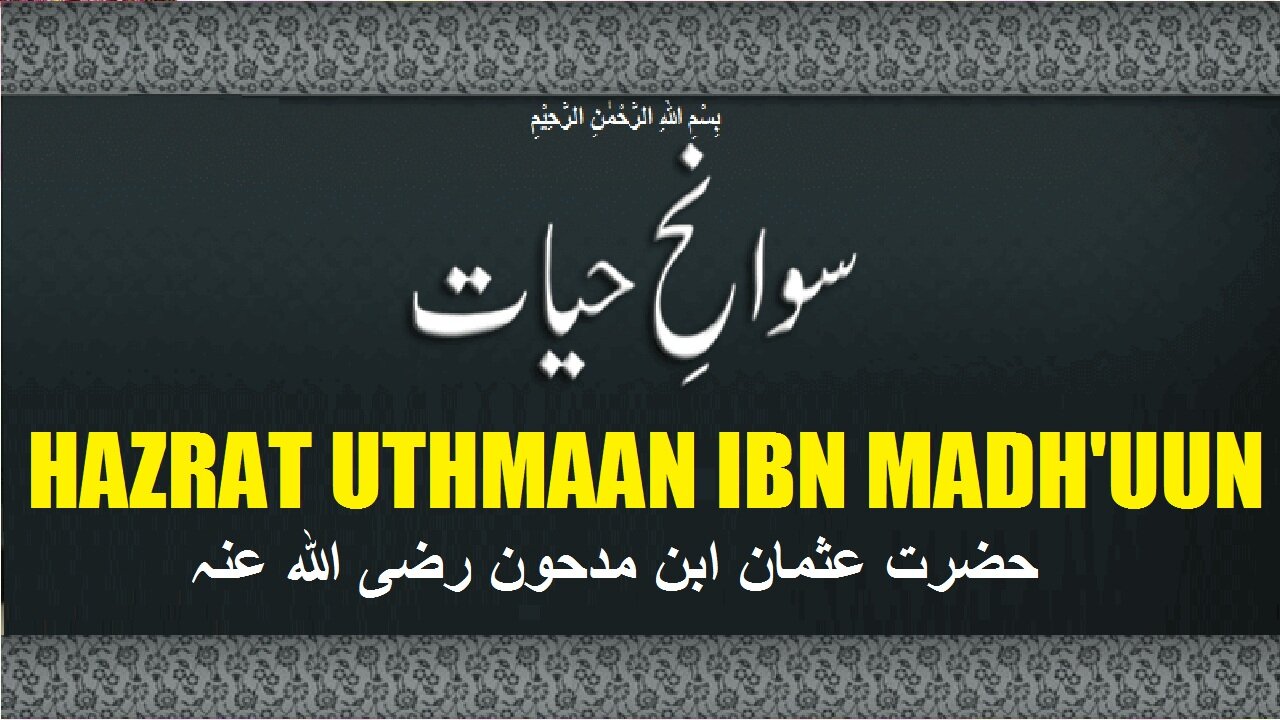Premium Only Content

Biography Hazrat Uthmaan Ibn Madhuun سیرت صحابہ کرام رضی اللہ عنہ حضرت عثمان ابن مدحون رضی اللہ عنہ
Biography Hazrat Uthmaan Ibn Madhuun سیرت صحابہ کرام رضی اللہ عنہ حضرت عثمان ابن مدحون رضی اللہ عنہ
Asslamoalaikum, sisters brothers and friends we are discribing biography of Sahabierasool HAZRAT UTHMAAN IBN MADH'UUN
A "Monk" whose Hermitage was Life
If you attempt to arrange the Prophet's Companions in the order of their embracing Islam, `Uthmaan Ibn Madh'uun will be number fourteen. Not onlywas he the first Muhaajir to die in Al Madiinah, but also the first Muslimto be buried in Al-Baqli'a. This glorious Companion whose life story youare about to hear was a great "monk". By "monk" here I mean a worshiper throughout life, not a monk sequestered in his hermitage, for life with all its commotion, turmoil, burdens, and virtues was his "hermitage". Life to him meant perseverance in the way of in the way of truth and unremitting self-denial good and righteousness.
When we go back in time, when the fresh early rays of Islam were emanating from the Prophet's heart (PBUH) and from his words said in secret and seclusion, `Uthmaan Ibn Madh'uun was there. He was one of the few who rushed to the way of Allah and supported the Prophet. When the Prophet (PBUH) ordered the few oppressed believers to emigrate to Abyssinia, he wanted to save them fromthe Quraish's oppression, while he chose to be left behind to face it alone.`Uthmaan, who was at the head of the first group of fugitives, was accompaniedby his son, As-Saa'ib. They set their faces towards a faraway land fleeingthe plots of Abu Jahi, Allah's enemy, and the Quraish's atrocities.
The emigration of `Uthmaan Ibn Madh'uun - and likewise for the rest of the emigrants to Abyssinia in the first and second emigrations - only made him hold more firmly to his Islam. Definitely, the two emigrations to Abyssinia represented a unique and glorious phenomenon in the cause of Islam, forthose who believed in Muhammad (PBUH) and followed the light that had beensent down to him had had enough of paganism, error, and ignorance. Theircommon sense shunned the idolatry of statues made of rocks and clay. Whenthese fugitives emigrated to Abyssinia, they found an already prevalent andhighly disciplined religion with an established clerical hierarchy of bishopsand priests. Notwithstanding their attitude towards this religion, it wasdefinitely remote from both the familiar paganism practiced back home andthe usual idolatrous rites they had left behind. Undoubtedly, the clergyin Abyssinia exerted much effort to lure those emigrants to apostatize andembrace Christianity.
In spite of all this, those emigrants stood steadfast in their profound loyalty to Islam and to the Prophet Muhammad (PBUH). They anxiously yearned for the day when they would return to their beloved country so as to worship Allah and support the great Prophet (PBUH) in the mosque in peacetime and in the battlefield when the power of disbelief forced them to take up arms. Thus, those emigrants who lived in Abyssinia felt secure and peaceful. `Uthmaan lbn Madh'uun was one of them, yet his expatriation did not make him forget his cousin Umaiyah Ibn Khalaf's plots and the abuse he dealt him and other Muslims. Hence, he used to amuse himself by rehearsing threats to him, saying, "I hope that all the arrows you aim will miss their target and strike back at you. You fought against generous and noble people and tortured them to death. You will soon be punished, and the common people you used to despise will get back at you."
While the emigrants were, despite their exile, wrapped up in their worship of Allah and the study of the Qur'aan, news spread that the Quraish had submitted themselves to Islam and prostrated themselves to Allah, the One, the Irresistable.
Hurriedly, driven by their nostalgic feelings, the emigrants packed up their belongings and hastened to Makkah. However, no sooner had they reached Makkah's outskirts than they realized that the news about the Quraish's submission to Islam was only the bait to lure them to return. Suddenly, they realized that their excessive credulity had led them right into this trap, yet there was nothing they could do, for Makkah was in sight and there was no escape whatsoever. Makkah's unbelievers were overjoyed to hear that their long-awaited prey was caught in the trap they had laid.
At that time, the right of protection - to be under the assistance, support, refuge, and protection of his patron - was a sacred and honored Arab tradition. Consequently, if a weak man had a claim on a man of high standing, he would instantly enjoy the privileges of the right of protection and would be under an invincible protection and safety. Naturally, not all of those who returned to Makkah had claims on a high-ranking man. Therefore, few enjoyed the protection and safety guaranteed by this right. Among those who did was `Uthmaan Ibn Madh'uun, who had a claim on Al Waliid lbn Al-Mughiirah. Hence, he entered Makkah safely and peacefully and attended its councils without being humiliated or harmed.
-
 5:41
5:41
ISLAMIC HISTORY
18 hours agoBiography of American Scholar Margot Badran امریکی اسکالر مارگوٹ بدران کی سوانح عمری۔
12 -
 LIVE
LIVE
Biscotti-B23
1 hour ago🔴 LIVE SEASON 12 🔥 TAMAKI AMAJIKI IS INSANE & NEW ENDEAVOR QUIRK SET 💥 MY HERO ULTRA RUMBLE
521 watching -
 LIVE
LIVE
B2ZGaming
5 hours agoPlay All The Games?! | B2Z Gaming
103 watching -
 2:17:23
2:17:23
Side Scrollers Podcast
19 hours agoIronmouse/Vshojo SCANDAL, Stripe DE-BANKING “Wrong Think”, RIP Theo | Side Scrollers
25.9K1 -
 6:43:02
6:43:02
Outworldlive
7 hours agoGames, Nite Cap 106, more games!
496 -
 20:44
20:44
GritsGG
1 day agoThis Warzone Item is BROKEN!
17.9K5 -
 2:31:58
2:31:58
BBQPenguinn
2 hours agoTasking & PVP!
2951 -
 21:12
21:12
DeVory Darkins
1 day ago $4.31 earnedMigrants OPEN FIRE on Border Patrol Agent... Hunter Biden drops EXPLOSIVE interview
8.07K78 -
 57:40
57:40
Omar Elattar
9 months agoDean Graziosi: How I Made $70 Million & Retired My Mom At Age 24
9.48K -
 2:16:08
2:16:08
The Pascal Show
13 hours ago $1.52 earnedGHISLAINE BREAKS SILENCE! DOJ To MEET With Ghislaine Maxwell! Epstein List To Be Exposed & More News
10K1